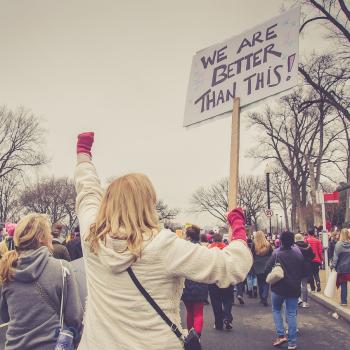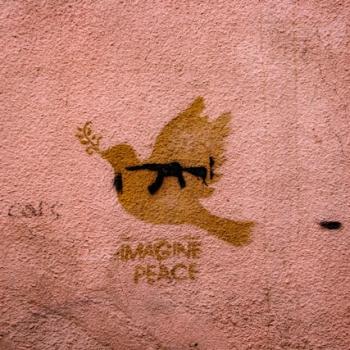Lectionary Reflections
Matthew 5:38-48
February 23, 2014
Our text for this week involves two more of Jesus' "antitheses"—those statements that say, "You have heard it said … but I say to you." Both have to do with how we relate to those who are working to harm us. The first stipulates what we are not to do—resist an evildoer. The second stipulates what we are to do—pray for our enemies.
The first antithesis (5:38-42) includes what New Testament scholar Robert Tannehill calls a "focal instance," exaggerated scenes that depict extremes of behavior.
"You have heard it said, 'An eye for an eye and a tooth for a tooth.' But I say to you, do not resist an evildoer. If anyone strikes you on the right cheek turn the other also, and if anyone wants to sue you and take your coat, give your cloak as well; and if anyone forces you to go one mile, go also the second mile. Give to everyone who begs from you, and do not refuse anyone who wants to borrow from you" (Mt. 5:38-42).
In this "focal instance," Jesus used what New Testament scholars often call the "rhetoric of excess." We are to read this scene, in my view, not as a universal rule for how to respond when we encounter physical violence or theft. Rather, it is to be applied like a proverb; we are to decide in which situations it is a wise ethical guideline and in which it is not. But it sets forth the ethical value of non-resistance as a valid strategy.
I have heard conventional teachings about an eye for an eye and a tooth for a tooth, and love of neighbor/hatred of enemies. I also live by those conventional teachings and am unlikely to change unless I encounter a powerful change agent. I'll be honest, there are some things I already know I will and won't do. I will probably give to those who beg from me. I am likely to lend to those who want to borrow from me. But I am not going to allow an evildoer to go unresisted. I am not going to turn the other cheek. I am not giving up my cloak. And I am not going the second mile. Not unless there is an intervention of some kind that causes me to change my mind, a change agent that comes onto the scene.
Now, onto the second antithesis:
"You have heard that it was said, 'You shall love your neighbor and hate your enemy.' But I say to you, love your enemies and pray for those who persecute you, so that you may be children of your Father in heaven; for he makes the sun rise on the evil and on the good, and sends rain on the righteous and on the unrighteous. For if you greet only your brothers and sisters, what more are you doing than others? Do not even the Gentiles do the same? Be perfect, therefore, as your heavenly Father is perfect" (Mt. 5:42-48).
This antithesis I do take to be a universally applicable lesson. I believe that God does want me to always pray for my enemies. And, since praying for those working against me doesn't preclude self-defense, I think I could give it a try. It doesn't say I have to ever trust my enemies again. Just pray for them.
As the antithesis about an eye for an eye is followed by a focal instance, so this second antithesis (Mt. 5:42-48) is followed by an analogy.
We all know how to read analogies. Most of us remember from standardized tests in high school that the symbol (:) means "is to" and the symbol (::) means "as."
Aspirin: headache :: nap : fatigue
To figure out an analogy we start by determining the relationship between the first pair of words. One approach is to try putting the first pair into a sentence: "Aspirin relieves a headache." Therefore, a nap relieves fatigue.
In our text the analogy could be expressed like this:
God: sun :: human being: love
God sends the sun to shine on the good and the bad. So our love for our fellow human beings is to be directed toward those who love us and those who hate us.
It is not an analogy that reflects the way things are, but the way they ought to be.
What does the fact that God makes the sun rise on the righteous and the unrighteous have to do with the way we treat other people? It is a way of saying that, as God does not deny the sun to the unrighteous, so we should not deny our love and prayers to our enemies, those who persecute us.
So firmly entrenched are most of us in our desire to strike back at those who hurt us and harbor enmity toward them in our hearts that it will take no less a change agent than divine love to melt our hearts, a love that, like sunshine, shines on them as well as us, on us as well as them.
After the analogy test of verse 45 comes another one in verse 46: "If you love those who love you, what reward do you have? Do not even the tax collectors do the same? If you greet only your brothers and sisters, what more are you doing than others? Do not even the Gentiles do the same?"
:::page break:::





